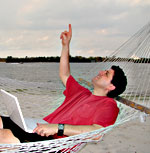Meet the IBEX Team: Nathan Schwadron

Working hard, staying positive and taking advantage of new opportunities has helped Nathan Schwadron to achieve his goals: at a young age, Nathan was drawn to Physics, and, in college, he decided to pursue a career in the field.
The child of a journalist/cartoonist and social worker in Ann Arbor, Michigan, Nathan got hooked on books about physics early in his life. "Some of the first books I ever read were written by Carl Sagan. I found them inspiring and amazing," he said.
Nathan's father noticed that his son was drawn to abstract mathematical concepts, and did his best to nurture this interest. "[My father] introduced me to imaginary numbers when I was quite young, "Nathan said. His father's example also continues to shape Nathan's life: "[My father's] work ethic and independent thinking continue to impress and inspire me."
Earning an undergraduate degree from Oberlin College and a PhD in physics from the University of Michigan put Nathan on the path to becoming a physicist. However, getting through school was tough. "I didn't think I could [become a physicist]," Nathan said. "I was pleasantly surprised to discover that I could make a career in physics."
He has since realized that his hard work, dedication and teamwork made a big difference in achieving his professional goals. "One thing I've discovered over the last 5 years is how hard work can really pay off. I try to be honest, supportive and a good team player — all the things that you learn in Kindergarten — and it helps a lot," he said.
Nathan began to achieve his professional dreams as a scientist at the Southwest Research Institute (SwRI) in San Antonio, Texas, where he began working on the IBEX mission (he recently left to accept a position as a professor at Boston University). "Winning the IBEX mission was something that was too fantastic to come true," Nathan said.
He emphasizes that teamwork is essential to the success of the IBEX mission. "Being involved in a mission like IBEX means jumping into new problems, figuring out what needs to be done, and either taking the next steps or helping to get the work done as efficiently as possible." he said.
Although he now works at Boston University, Nathan continues with the IBEX mission as a co–investigator. One of his tasks involves creating the science analysis plan for the mission. A key challenge is unraveling the heliosphere's global structure using data that the IBEX spacecraft will collect as it spins and orbits throughout a year.
Nathan balances work on the IBEX mission with teaching and advising students. He loves his job. "I enjoy working with students a great deal and I enjoy the research. I love the process where new observations can bring about radical changes in understanding. The way we think about a problem for many decades can change on a dime. That for me is extremely exciting," he said.
However, doing research and teaching does have its challenges. "It's hard to help raise a family and do this amount of work all the time," Nathan said, "and so I've learned to take things one day at a time and not to get too focused on my goals and ambition. In my career there have been many letdowns. I have to work to stay positive and constructive. There's a constant disconnect between living and working. It's hard to maintain a good balance, but it's critical."
Nathan tries hard to maintain a work–life balance by running and making time to "goof off" with his kids on vacation (see the picture of him "at work" at a Disney theme park).
For Nathan, watching kids explore the world is a great example of how the scientific thinking he uses on the job is part of everyone's daily life. "Science is ultimately about applying logic and trial–and–error to solve the difficult puzzles of the physical universe. A small child uses trial–and–error to learn. They learn to open a door by trying different mechanisms: developing ideas about how the door works, testing these ideas, often getting frustrated, even injured, but ultimately mastering the mechanism. It is the same process we use to advance in science. We develop ideas and test them. The only real difference is that scientists write journal articles about their results, whereas most children simply learn and move on to the next puzzle. Whatever their work, it is extremely important that people apply active thinking and logical reasoning to things they do – we must test our ideas, models and theories," Nathan said.
Active thinking will guide the future of space exploration, and Nathan hopes he will have the opportunity to be a part of it. "I will do what I've always done, which will be to explore new opportunities that comes my way. I hope as a nation we continue to be bold and unrivaled in our thirst for knowledge," he said.